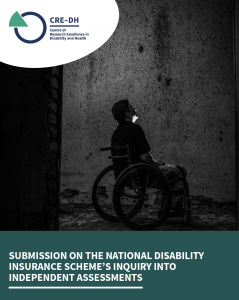Submission on the Inquiry into Independent Assessments to the Joint Standing Committee of the NDIS
The National Disability Insurance Scheme was established to provide people living with a disability high quality and tailored support, but the federal government is proposing radical reforms to the scheme.
The overhaul includes introducing the use of independent assessors to decide what participants’ needs are and how much funding they will receive, replacing the use of existing doctors and medical reports. People with disability, advocates and organisations across Australia have voiced their concerns about the Government’s planned introduction of Independent Assessments (IAs) to the National Disability Insurance Scheme (NDIS).
As researchers with expertise in disability policy, we too are concerned that the introduction of IAs will be damaging to current and potential NDIS participants.
We are equally concerned that the ‘consultation’ process on this policy has not been consistent with the core principles of the scheme including co-design, choice and control.
We have outlined our concerns according to the terms of reference in a submission to the Committee, which you can access in full below.

IAs have been justified on the basis that they will lead to consistency and therefore be more equitable, concentrate function rather than medical diagnosis, and Scheme sustainability. We believe that they fail on all these objectives and that their use will exacerbate inequities in practice.
Against this background we are calling for:
- A halt to the implementation of Independent Assessments
- A commitment to release pilot data collected to date including how they were used to determine funding outcomes
- A commitment to co-produce any future functional assessment component of the scheme and its evaluation with people with disability and other stakeholders with expertise in the area including academics and allied health professionals
- A commitment to rigorous evaluation of functional assessments against their purpose of allocation of budgets for reasonable and necessary supports that meet participants’ goals
- A commitment to not use functional assessments as the sole (or main) basis of funding decisions
- A commitment to determining ‘reasonable and necessary’ support on the basis of individual goals
- A commitment to promoting equity through investment in advocacy and development of culturally appropriate services in areas of need.
We believe IAs should not be implemented because they have not been developed for the purposes for which they are being used. They will not be aligned with the goals and needs of individual participants, they will not have equal impacts, they will cause significant distress among participants, and may result in shifting costs to other systems (e.g., health, welfare).
Professor Helen Dickinson, UNSW Canberra
Professor Anne Kavanagh, University of Melbourne
Professor Gemma Carey, UNSW
Centre of Research Excellence in Disability and Health
Reports:
- CRE-DH Submission to the Joint Standing Committee on the National Disability Insurance Scheme – Inquiry into Independent Assessments (Web, PDF, Word)
Media:
- NDIS independent assessments are off the table for now. And that’s a good thing-the evidence wasn’t there, Anne Kavanagh and Helen Dickinson in The Conversation, 12 July 2021
- ‘Dehumanising’ and ‘a nightmare’: Why NDIS assessments should be scrapped, Helen Dickinson in The Conversation, 12 March 2021
Publications:
- Dickinson H, Kavanagh A & Carey G. Submission on the National Disability Insurance Scheme’s Inquiry into Independent Assessments to the Joint Standing Committee. Melbourne: Centre of Research Excellence in Disability and Health, 7 April 2021. https://doi.org/10.26188/14384561
